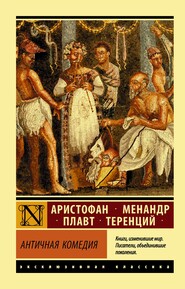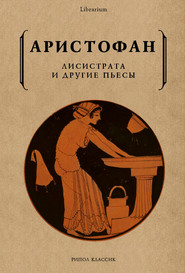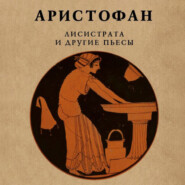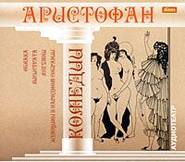По всем вопросам обращайтесь на: info@litportal.ru
(©) 2003-2024.
✖
The Eleven Comedies, Volume 1
Автор
Год написания книги
2018
Настройки чтения
Размер шрифта
Высота строк
Поля
STREPSIADES. 'Twill be the death of me.
PHIDIPPIDES. But you will certainly feel no more anger because of the blows I have given you.
STREPSIADES. Come, show me what profit I shall gain from it.
PHIDIPPIDES. I shall beat my mother just as I have you.
STREPSIADES. What do you say? what's that you say? Hah! this is far worse still.
PHIDIPPIDES. And what if I prove to you by our school reasoning, that one ought to beat one's mother?
STREPSIADES. Ah! if you do that, then you will only have to throw yourself along with Socrates and his reasoning, into the Barathrum.[575 - A cleft in the rocks at the back of the Acropolis at Athens, into which criminals were hurled.] Oh! Clouds! all our troubles emanate from you, from you, to whom I entrusted myself, body and soul.
CHORUS. No, you alone are the cause, because you have pursued the path of evil.
STREPSIADES. Why did you not say so then, instead of egging on a poor ignorant old man?
CHORUS. We always act thus, when we see a man conceive a passion for what is evil; we strike him with some terrible disgrace, so that he may learn to fear the gods.
STREPSIADES. Alas! oh Clouds! 'tis hard indeed, but 'tis just! I ought not to have cheated my creditors…. But come, my dear son, come with me to take vengeance on this wretched Chaerephon and on Socrates, who have deceived us both.
PHIDIPPIDES. I shall do nothing against our masters.
STREPSIADES. Oh! show some reverence for ancestral Zeus!
PHIDIPPIDES. Mark him and his ancestral Zeus! What a fool you are! Does any such being as Zeus exist?
STREPSIADES. Why, assuredly.
PHIDIPPIDES. No, a thousand times no! The ruler of the world is the Whirlwind, that has unseated Zeus.
STREPSIADES. He has not dethroned him. I believed it, because of this whirligig here. Unhappy wretch that I am! I have taken a piece of clay to be a god.
PHIDIPPIDES. Very well! Keep your stupid nonsense for your own consumption. (Exit.)
STREPSIADES. Oh! what madness! I had lost my reason when I threw over the gods through Socrates' seductive phrases. Oh! good Hermes, do not destroy me in your wrath. Forgive me; their babbling had driven me crazy. Be my councillor. Shall I pursue them at law or shall I…? Order and I obey.—You are right, no law-suit; but up! let us burn down the home of those praters. Here, Xanthias, here! take a ladder, come forth and arm yourself with an axe; now mount upon the school, demolish the roof, if you love your master, and may the house fall in upon them, Ho! bring me a blazing torch! There is more than one of them, arch-impostors as they are, on whom I am determined to have vengeance.
A DISCIPLE. Oh! oh!
STREPSIADES. Come, torch, do your duty! Burst into full flame!
DISCIPLE. What are you up to?
STREPSIADES. What am I up to? Why, I am entering upon a subtle argument with the beams of the house.
SECOND DISCIPLE. Hullo! hullo! who is burning down our house?
STREPSIADES. The man whose cloak you have appropriated.
SECOND DISCIPLE. But we are dead men, dead men!
STREPSIADES. That is just exactly what I hope, unless my axe plays me false, or I fall and break my neck.
SOCRATES. Hi! you fellow on the roof, what are you doing up there?
STREPSIADES. I traverse the air and contemplate the sun.[576 - He repeats the words of Socrates at their first interview, in mockery.]
SOCRATES. Ah! ah! woe is upon me! I am suffocating!
CHAEREPHON. Ah! you insulted the gods! Ah! you studied the face of the moon! Chase them, strike and beat them down! Forward! they have richly deserved their fate—above all, by reason of their blasphemies.
CHORUS. So let the Chorus file off the stage. Its part is played.
* * * * *
FINIS OF "THE CLOUDS"
* * * * *
notes
1
Ancient Classics for English Readers: Aristophanes, by Lucas Collins, Introductory Chapter, p. 2.
2
"Aristophane": Traduction Nouvelle, par C. Poyard (Paris, 1875): Introduction.
3
Ancient Classics for English Readers: "Aristophanes," by Lucas Collins. Introductory Chapter, p. 12.
4
Mitchell's "Aristophanes." Preface to "The Knights."
5
A generic name, used to denote a slave, because great numbers came from Paphlagonia, a country in Asia Minor. Aristophanes also plays upon the word, [Greek: Paphlag_on], Paphlagonian, and the verb, [Greek: pathlazein], to boil noisily, thus alluding to Cleon's violence and bluster when speaking.
6
A musician, belonging to Phrygia, who had composed melodies intended to describe pain.
7
Line 323 of the 'Hyppolytus,' by Euripides.











